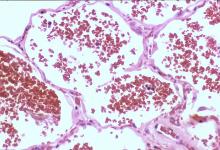Be ‘on point’: Guidelines for rheumatic complications of immunotherapy Save

At EULAR 2019, Madrid, several recommendations including RA, SLE, and Sjogren’s syndrome have been developed. Agreement for principles with respect to the treatment of immune mediated adverse events from cancer immunotherapy are lacking.
Kostine M, et al (OP0165) have authored recommendations about treatment of rheumatic immune-related adverse events (irAEs) related to cancer immunotherapy. This is relevant to people with a rheumatic disease where it worsens while on immunotherapy for cancer; or for de nouveau cases developing a rheumatic disease while on a check point inhibitor. Importantly most immune reactions are not rheumatic (rash, entercolitis, pneumonitis, thyroiditis and myocarditis are more frequent than rheumatic diseases) (Ramos-Casais M, THU0628).
A retrospective study of 635 cancer patients (mostly with melanoma, but also non-small cell lung and renal cancer) who were prescribed immune checkpoint inhibitors showed that 8% had a pre-existing autoimmune disease (rheumatic or endocrine). Additionally, if baseline glucocorticoids were at 10mg per day or more, the tumor response and median survival were both decreased (Kostine M, OP0336)! However, if treated with steroids after onset of immune therapy for an irAE, steroids did not influence efficacy. This paradoxical finding could be due to the observation that those who develop an irAE may have more efficacy from their cancer treatment (i.e. demonstrating that immune checkpoint changes are occurring) whereas, I speculate, those needing high-dose steroids for any reason while starting cancer therapy likely reduces prognosis due to more infections, and other steroid side effects that could reduce survival. There could also be confounding where some patients on high dose steroids are receiving them due to perineoplastic complications including inflammatory myositis (esp. dermatomyositis) which may in general have a worse prognosis and would require high doses of steroids.
At this point in time, recommendations (OP0165) may guide rheumatologsits and oncologists in further awareness of rheumatic diseases onsetting or worsening with immune therapy and allow standard of care treatment to occur including steroids, DMARDs and biologics where needed; but limiting steroids prior to checkpoint treatment where possible in our patients with established rheumatic diseases due to the finding of reduced survival of concomitant moderate or high dose steroids when initiating immune therapy.










If you are a health practitioner, you may Login/Register to comment.
Due to the nature of these comment forums, only health practitioners are allowed to comment at this time.